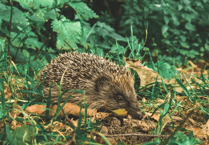In this week’s column from the Manx SPCA, Juana Warburton explains how you can keep the island’s bird population healthy during the winter...
Last week’s Arctic blasts of cold wind and lower than usual temperatures mean that we all have to do a little bit extra to help wildlife, and in particular our garden birds. Birds need more energy to stay warm at this time of year, but they have fewer daylight hours in which to search for food, and most of their usual sources are depleted – less berries on the bushes, fewer insects, very little seed in the grass, etc.
Giving wild birds a helping hand could, literally, be the difference between life and death for many of them during a cold snap, and there are some very simple things we can all do for them in our gardens and green spaces.
Whist you can buy bird nuts, seed and fat balls from most supermarkets and pet shops, you can also make your own feeders from kitchen scraps. Please remember to hang your bird feeders in a position that makes it difficult for a predatory cat to reach them – high up in tree branches, or over prickly bushes. It’s also important to clean the feeders regularly to prevent the spread of disease, and to move them around to prevent a build-up of bird feces below (which may attract vermin).
And please don’t forget that wild birds cannot always find fresh water for drinking and bathing, and this becomes even more difficult when natural sources freeze over. Make sure your bird bath is topped up with fresh water, and check it every morning to ensure it hasn’t frozen over.
Longer term, you can make provision for wild birds by planting hedges such as privet or hawthorn, and allowing ivy and holly to grow. These all provide good shelter for wild birds, and they attract insects too – the bird equivalent of ‘bed and breakfast’! Birds will also occupy nest boxes on cold winter nights, and not simply use them for egg laying and bringing up chicks, and so please keep them in situ all year round.
Robins are, arguably, our most iconic and recognisable garden bird, but they struggle more than most and need our help to make it through the winter. They rarely live longer than two years; indeed, the majority are dead by spring. This is because they must eat between one quarter and one third of their body weight every single day, just to survive. And for many, it’s a losing battle. Robins are ground feeders and so when it’s icy or snowy they can’t forage for the insects they need to survive, despite having comparatively large eyes which help them to see in poor light.
Robins have just one aim at this time of year – to survive, and reach the point when they can breed and pass on their genetic heritage to the next generation. This is why they sing all year round (one of our few bird species to do so) as a way of maintaining territories ready for the mating season in spring. Both sexes sing, and both sexes have red breasts.
Bird song has been scientifically proven to lift human spirits – all the more reason to welcome robins and other wild birds into your garden or window ledge, particularly with ‘blue Monday’ just around the corner (20th January).
Aswell as feeding wild birds, you can also help them by taking part in the RSPB’s Big Garden Birdwatch between 24thand 26th January (visit https://rspb.org.uk/whats-happening/big-garden-birdwatch). You simply need to observe the birds that you see in a 60 minute period, and let the RSPB have your results. Hundreds of thousands of ‘citizen scientists’ take part in this survey every year, and they help the RSPB to build a picture of the species that are faring well, and those that are not. This then informs projects aimed at helping to stem population declines where they are worst.




